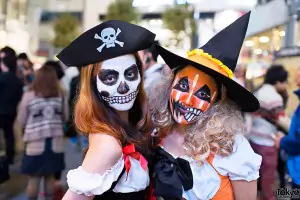Like Christmas, New Year’s Day, Ramadan, or Yom Kippur, Halloween is celebrated almost in every country, even if the celebration implies only external attributes, such as pumpkins, costumes, and children asking for candy. Though the initial meaning of Halloween had much to do with occult powers, spirits, and protection against evil forces, today it is more of a merry holiday, a little bit spooky, but still enjoyed both by adults and children. So, what are the origins of Halloween?

✅ AI Essay Writer ✅ AI Detector ✅ Plagchecker ✅ Paraphraser
✅ Summarizer ✅ Citation Generator
Historically, the word Halloween is a contraction of the phrase “All Hallows Even,” which meant the day before All Hallows Day (more known as All Saints’ Day) (About.com). It was a Catholic holiday dedicated to the commemoration of saints and martyrs for faith; today, though, we know it more as a holiday of trick-or-treating, scary costumes, and funny pranks. Gradually, Halloween has lost its religious connotations, and has turned into a holiday gladly celebrated by youth and adults across the western world on October 31.
Though it is considered that Halloween has its origins in the early Middle Ages, some scientists think it is even more ancient. Peter Tokofsky, an assistant professor in the department of folklore and mythology of UCLA, believes Halloween as we know it today arose from the Celtic festival Samhain (Albany.edu). Samhain was demarcating the end of summer; on this day, souls of the dead were believed to be penetrating the real world. This was also the Celtic New Year, and druids used to celebrate it with a great fire festival, to ‘support’ the dimming Sun and not to let it vanish.
It was believed during Samhain that the living were entertaining the dead; on that night, spirits were looking for a body to possess for the entire incoming year. To avoid such a destiny, people would dress up like evil spirits themselves; scary masks or masks of animals were used to mimic these spirits and deceive them, thus avoiding being possessed. Most likely, this rite has given the start to the modern tradition to wear costumes of ghosts and witches on Halloween.
Later, Samhain was influenced by Roman and Christian cultures after Pope Gregory III designated November 1 as a time to honor all saints and martyrs (History.com). Halloween gradually started to gain its modern features and characteristics. Though Halloween today is seen more as an American holiday, it was transported to North America by Irish immigrants in the middle 1800s (About.com). There it became, to a significant extent, commercialized and popularized, and its religious background has been almost forgotten; at the same time, back on the lands where Samhain originated, even in 19th century, people were afraid to walk outside after nightfall.
Along with Christmas, the New Year’s Day, and other grand holidays, Halloween is one of the most ancient and mysterious festivals, which has its origins in long forgotten pagan beliefs and rituals. As it happened to the majority of these holidays, Halloween’s religious connotations are today known by few; nowadays, it is celebrated more for fun. But, despite this, an attentive and curious researcher will easily trace the spirit of hoary rites and customs in modern trick-or-treating, cosplay, and symbols.
References
Emery, David. “A Quick Guide to the Origin & History of Halloween.” About.com. N.p., n.d. Web. 14 Oct. 2013. <http://urbanlegends.about.com/od/halloween/a/History-Of-Halloween.htm>
“The Origins of Halloween.” Albany.edu. N.p., n.d. Web. 14 Oct. 2013. <http://www.albany.edu/~dp1252/isp523/halloween.html>
“Halloween.” History.com. A&E Television Networks, n.d. Web. 14 Oct. 2013. <http://www.history.com/topics/halloween>
Follow us on Reddit for more insights and updates.






Comments (0)
Welcome to A*Help comments!
We’re all about debate and discussion at A*Help.
We value the diverse opinions of users, so you may find points of view that you don’t agree with. And that’s cool. However, there are certain things we’re not OK with: attempts to manipulate our data in any way, for example, or the posting of discriminative, offensive, hateful, or disparaging material.
Comments are closed.